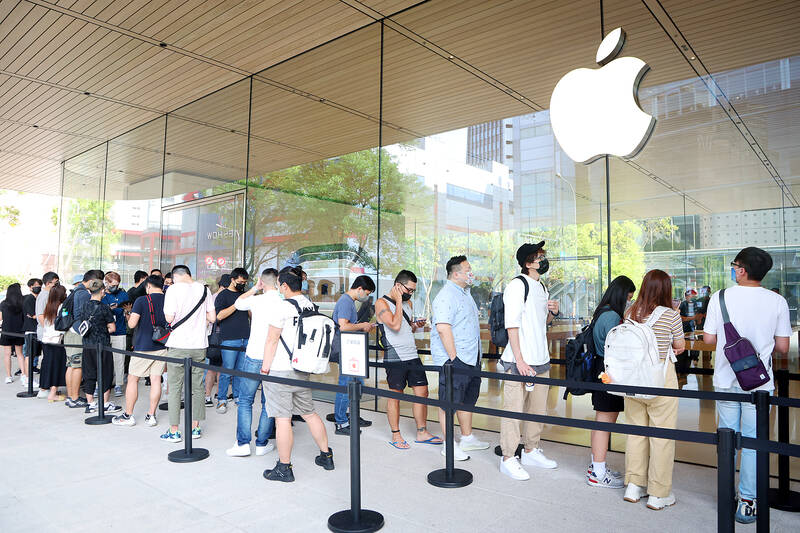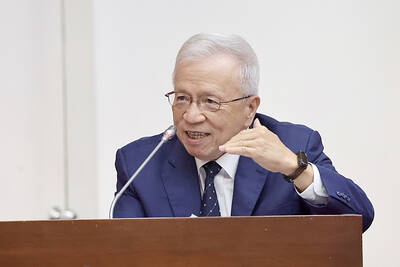Far EasTone Telecommunications Co (遠傳電信) yesterday said that chances are good its 5G subscription penetration rate would reach 30 percent ahead of schedule on the back of strong presale orders of the new iPhone series.
The telecom expects to sell 20 to 30 percent more devices by the end of this year from the iPhone 14 series than the previous-generation iPhone 13 models in the same period last year, as presale orders are nearly double, it said.
Persistent expansion of its 5G subscriber base has made that group about 25 percent of its overall postpaid subscribers, compared with about 20 percent at the end of the second quarter, Far EasTone Telecommunications said.

Photo: CNA
The carrier said that it has a goal of 30 percent 5G subscriptions by Dec. 31.
Its subscribers who use iPhones usually sign long-term contracts averaging 30 months, it said.
This year, most of the contracts signed by people seeking an iPhone 14 phone have top-end subscriptions with a minimum payment of NT$1,399 per month, it said.
Sixty to 70 percent of them have contracts of 36 to 48 months, it said.
The company aims to sell more than 200,000 iPhone 14s by the end of this year, it said, after Chunghwa Telecom Co (中華電信), the nation’s biggest telecom, announced the same target.
The new models generated three times as many presale orders as the company obtained last year when the iPhone 13 models were released, Chunghwa Telecom chairman Sheih Chi-mau (謝繼茂) said.
At the rate the new models are selling, the telecom could sell more than 200,000 of the new iPhones by the end of this year, he said.
The hype surrounding the iPhone 14 might help Chunghwa Telecom hit its target of 30 percent 5G penetration by the end of this year, Sheih said.
The most popular color seems to be purple, followed by starlight, which combined made up 70 percent of presales, Sheih said.
The new devices, which went on sale yesterday, are available in “midnight” (black), purple, “starlight” (white), red and blue.
Taiwan Mobile Co (台灣大哥大) chief business officer Tony Lin (林東閔) said that his firm had received twice as many orders for iPhone 14s during presale as it did last year for iPhone 13s.
About 80 percent of its customers who purchased new iPhones bought the iPhone 14 Pro, which is expected to drive up subscriptions to the company’s 5G plans by 20 to 30 percent, Lin said.
Taiwan Star Telecom Corp (台灣之星) said in a statement that its presales of iPhone 14s have grown 20 percent over presales of iPhone 13s last year.
The most popular color among its customers was purple, followed by blue, and the hottest models were the iPhone 14 Pro and iPhone 14 Pro Max, together accounting for 80 percent of its sales, it said.

JITTERS: Nexperia has a 20 percent market share for chips powering simpler features such as window controls, and changing supply chains could take years European carmakers are looking into ways to scratch components made with parts from China, spooked by deepening geopolitical spats playing out through chipmaker Nexperia BV and Beijing’s export controls on rare earths. To protect operations from trade ructions, several automakers are pushing major suppliers to find permanent alternatives to Chinese semiconductors, people familiar with the matter said. The industry is considering broader changes to its supply chain to adapt to shifting geopolitics, Europe’s main suppliers lobby CLEPA head Matthias Zink said. “We had some indications already — questions like: ‘How can you supply me without this dependency on China?’” Zink, who also

At least US$50 million for the freedom of an Emirati sheikh: That is the king’s ransom paid two weeks ago to militants linked to al-Qaeda who are pushing to topple the Malian government and impose Islamic law. Alongside a crippling fuel blockade, the Group for the Support of Islam and Muslims (JNIM) has made kidnapping wealthy foreigners for a ransom a pillar of its strategy of “economic jihad.” Its goal: Oust the junta, which has struggled to contain Mali’s decade-long insurgency since taking power following back-to-back coups in 2020 and 2021, by scaring away investors and paralyzing the west African country’s economy.

Taiwan Semiconductor Manufacturing Co (TSMC, 台積電) received about NT$147 billion (US$4.71 billion) in subsidies from the US, Japanese, German and Chinese governments over the past two years for its global expansion. Financial data compiled by the world’s largest contract chipmaker showed the company secured NT$4.77 billion in subsidies from the governments in the third quarter, bringing the total for the first three quarters of the year to about NT$71.9 billion. Along with the NT$75.16 billion in financial aid TSMC received last year, the chipmaker obtained NT$147 billion in subsidies in almost two years, the data showed. The subsidies received by its subsidiaries —

BUST FEARS: While a KMT legislator asked if an AI bubble could affect Taiwan, the DGBAS minister said the sector appears on track to continue growing The local property market has cooled down moderately following a series of credit control measures designed to contain speculation, the central bank said yesterday, while remaining tight-lipped about potential rule relaxations. Lawmakers in a meeting of the legislature’s Finance Committee voiced concerns to central bank officials that the credit control measures have adversely affected the government’s tax income and small and medium-sized property developers, with limited positive effects. Housing prices have been climbing since 2016, even when the central bank imposed its first set of control measures in 2020, Chinese Nationalist Party (KMT) Legislator Lo Ting-wei (羅廷瑋) said. “Since the second half of